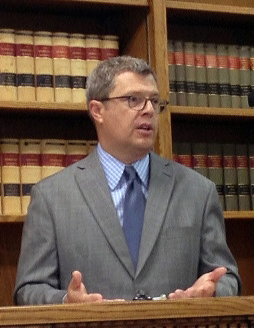Professor Brett Scharffs: Can public reason accommodate conscience?

Professor Brett G. Scharffs addressed the topic “Can Public Reason Accommodate Conscience?” at the Religious Freedom Discussion on Wednesday, September 4, 2013, at Brigham Young University and via live Webinar. Professor Scharffs is Francis R. Kirkham Professor of Law, Associate Director of the International Center for Law and Religion Studies, and Associate Dean of Research and Academic Affairs at the BYU Law School.
Download Professor Scharffs’ PowerPoint Presentation here.
Download the recording (.wmv) of the presentation here.
An internationally recognized scholar and lecturer in the fields of comparative law and religion, philosophy of law, and international business law, Professor Scharffs has written more than 50 articles and book chapters and has made more than 150 scholarly presentations in more than 20 countries. He is a graduate of Georgetown University, where he received a B.S.B.A in international business and an M.A. in philosophy. He was a Rhodes Scholar at Oxford University, where he earned a B.Phil in philosophy. He received his J.D. from Yale Law School, where he was Senior Editor of the Yale Law Journal.
Professor Scharffs was a law clerk on the U.S. Court of Appeals, D.C. Circuit, and worked as a legal assistant at the Iran-U.S. Claims Tribunal in The Hague. Before teaching at BYU, he worked as an attorney for the New York law firm Sullivan & Cromwell. He has previously taught at Yale University and the George Washington University Law School, and he is a visiting professor each year at Central European University in Budapest and is a regular contributing scholar in law education programs in China and Vietnam.
Public reason as a framework for political dialogue has come to have a force in American and European political thought that might have come as a surprise even to its most articulate contemporary defender, John Rawls. But as religious and other minority or dissenting voices are increasingly pushed to the margins of public discourse, a serious philosophical, political, and practical question has arisen about the extent to which public reason can accommodate claims of conscience. The basic problem can be presented starkly: if public reason rules inadmissible reasons that are not publicly accessible, is there any reason to respect conscience at all, since by its very nature the claims of conscience may be private and only partially accessible or explicable? If public reason reigns supreme as a model of public discourse, are claims of conscience doomed?
In tracing the genesis of the notion of public reason to the ideas of Thomas Hobbes as presented in his 1660 work The Leviathan, Professor Scharffs explained that for Hobbes, public reason was the will of the sovereign (and nothing more): It was the reason given by the King or Parliament (representing the public), as opposed to reasons given by subjects (private reasons, identified with claims of conscience). For Hobbes, the “law is the public Conscience,” and the obligation to obey the sovereign lasts as long as the sovereign protects his subjects. Claims of conscience were no more than private judgments seeking special status.
While a “Rawlsian” liberal would “strongly object to their understanding of public reason being linked with Hobbes’ sovereign Leviathan, Professor Scharffs nevertheless traces a clear trajectory of the course of public reason, and its exclusion of claims of conscience, from Hobbes through Rawls and through recent court cases and legislative decisions in the United States and Europe, to reach a dismal conclusion:
“We have reason to worry that [society’s current strong commitment to public reason] may lead to the Liberal Leviathan – the tyranny not of Hobbes’s imperial sovereign, but the tyranny of imperious majorities (or perhaps overbearing judges), confident (even self-righteous) in the reasonableness of their own views, and with every reason (in their minds) to disparage and disregard claims of conscience by those who would dissent; such claims of conscience being ipso facto ‘unreasonable’ because they do not satisfy the conditions of public reason.
“In dividing ‘reason’ into ‘public reason’ and ‘private reason,’ and by treating the one as legitimate and the other as illegitimate, and by placing comprehensive religious systems of belief into the category of ‘private reasons,’ public reason clears away the unruly underbrush of conscience in the service of building the shiny edifice of the Liberal Leviathan.”